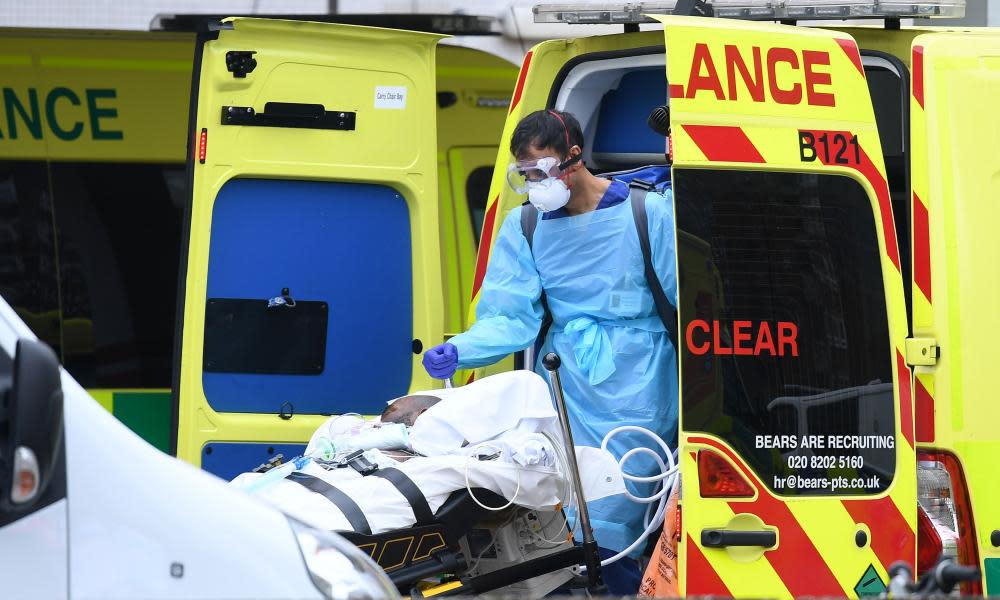Coronavirus took hold in UK earlier than thought, data reveals

The coronavirus outbreak took hold earlier in the UK and has claimed dozens more lives than previously thought, new data in England and Scotland has revealed.
Amid growing concern over the shifting picture of the outbreak presented by changes to the daily figures, NHS England said the earliest death occurred on 28 February, almost a week before previously acknowledged.
Health trusts in England disclosed that six people had died in hospitals from Covid-19 as early as February – with the first death previously made public on5 March. The news came as the UK endured its most deadly day of the coronavirus pandemic, in which 569 fatalities were recorded.
Scotland’s first minister, Nicola Sturgeon, admitted on Thursday that the death toll in Scotland had been significantly under-reported because of delays in notifying the government of 40 Covid-19 fatalities earlier this week, which increased Scotland’s total by 31% in a day.
The UK-wide figures showed that by 5pm on Wednesday a total of 2,921 people had died, following a slightly larger increase than the previous day, when there were 563 deaths.
By 9am on Thursday, 163,194 people had been tested for the virus across the UK, with 33,718 positive cases, representing a rise of 4,244 from the previous day. In all, 12,949 people have so far been hospitalised with symptoms.
The figures for deaths reveal a moving picture, with totals beset by inconsistencies and the overall number of deaths reported on any given day significantly higher than those from the preceding 24 hours. On Thursday, 561 deaths were reported, but only 84 took place in the 24 hours to 5pm on 1 April.
Earlier this week the number of deaths reported on one day was less than half the total number of deaths that occurred in the reporting period the day before. On 30 March, 159 deaths were reported by NHS England. The true number of deaths on that day has since been revised up to 401.
The new figures also reveal the age groups of those who have died to date. More than half of the patients (52%) who have died with coronavirus were over 80 years of age. Most of the other deaths (40%) were among patients aged between 60 and 79. A further 7% of deaths occurred in those aged between 40 and 59.
Less than 1% of the victims were under 40. The figures show three deaths in the under-20 category, and a further 22 victims aged between 20 and 39. A 13-year-old boy who died at King’s College hospital is believed to be the youngest victim so far.
Paul Hunter, a professor in medicine at the University of East Anglia specialising in infectious diseases, said the data suggested the UK was about two weeks behind Italy. “Yesterday was a huge jump on the previous day, which itself was a pretty big rise from the day before. This rise is slightly more than yesterday but essentially on par,” he said.
The Scottish government disclosed earlier on Thursday the number of Covid-19 deaths had appeared to jump 66% in one day, up by 50 from the 76 reported on Wednesday, after it emerged that 40 deaths earlier this week had not been recorded centrally.
The devolved government later released revised data for the week after using new methodology that included laboratory data. Until today, Covid-19 deaths in that set were not counted until next of kin had given permission for them to be recorded.
The updated figures showed that Scottish fatality rates began increasing much more steeply than thought on 31 March. Using the old system, the official death toll stood at 86 on Thursday; the new methodology put Thursday’s total at 126.
Catherine Calderwood, Scotland’s chief medical officer, said every death meant there were roughly 1,000 coronavirus infections in the general population, implying that 40,000 more Scots may have been infected.
Related: UK records 569 coronavirus fatalities on deadliest day so far
Sturgeon said there had been delays in obtaining relatives’ consent before some deaths were recorded centrally. Health Protection Scotland, a government agency, confirmed later that “new, more efficient” reporting procedures had now been introduced which did not need family consent.
“Part of the cruelty of this virus is that when people are in hospital and when they’re dying, family members are not able to be with them,” Sturgeon said. “Therefore it has taken a bit longer for families to be informed and for them to give their consent to all the things that are required.”
Opposition parties censured the Scottish government over the misreporting. Labour said it echoed concerns from GPs and families that deaths outside hospitals and “presumed deaths” were not being properly recorded and being missed.
Monica Lennon, Scottish Labour’s health spokesman, said: “Irrespective of where people have died, be it in their own house, a nursing home or a hospital, we need the full facts about this virus. It’s clear that a lack of testing is contributing to the lack of information, which is unacceptable.”
Additonal reporting: Niamh McIntyre and Pamela Duncan
Watch the latest videos from Yahoo UK


